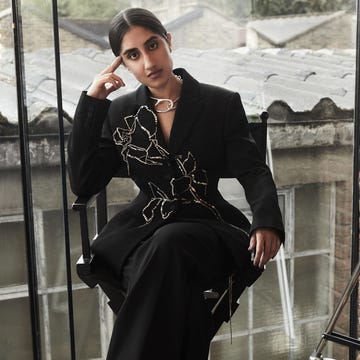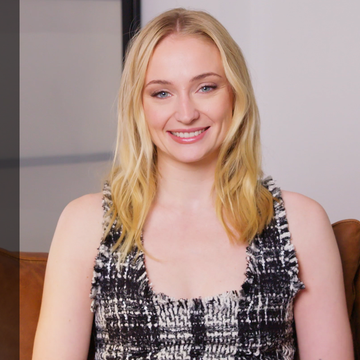It’s hard to corroborate, but I think Jilly Cooper may be the first recipient of a damehood in British history to describe the bestowal as "orgasmic". The honour – which she received this spring for services to literature and charity – was no surprise to the legions of fans who devour her epic Eighties novels, or anyone familiar with London’s powerfully moving Animals in War Memorial that she championed. The author herself, however, was astonished. "It was hysterical, really. I couldn’t believe it," she tells me, five months on from picking up the gong from King Charles III at Windsor Castle. "I adore the King, so I told him, 'We love you, we need you, you’ve got to stay well', and he told me about his two horses racing at Ascot. We had a giggle."
Such camaraderie is all the more remarkable when you recall that Cooper’s most famous and fancied recurring character Rupert Campbell-Black was notoriously inspired by Andrew Parker-Bowles, the Queen’s ex-husband. Rupert, however, is now seducing a whole new generation, thanks to the recent television adaptation of Rivals, one of Cooper’s Rutshire Chronicles. The novel, which follows the animosity and affairs between the Cotswolds’ most powerful, priapic and posh locals, has been brought to life by a cast including Aidan Turner, Danny Dyer and the emerging star Bella Maclean. It’s an unqualified success, universally thrilling critics, long-standing readers and fresh audiences. "I can’t believe it," she says. "It’s been just so exciting."
It’s something of a jewel in the crown for Cooper, whose early career consisted of being sacked 24 times from temp jobs before meeting The Sunday Times Magazine’s then-editor Godfrey Smith at a party. Charmed by her vivacity, he offered her a column, where she wrote about marriage, sex and housework with wit and honesty for more than a decade; she once interviewed Margaret Thatcher and described the Iron Lady’s transformation, after a question about her financial policy, into "a wonderfully comely steamroller".
Books followed, and continue to this day. Although her umpteen works of non-fiction – mostly memoirs-cum-life-manuals starting with 1969’s How to Stay Married – are excellent, she prefers writing fiction. With their riveting characters and irresistible insights into the worlds of the elite, her novels have sold prolifically since her first was published in 1975. Critics remained ambivalent, leading her to once comment: "The literary world is divided into two sets: people like me who long for a kind word in The Guardian and people in The Guardian who long for my sales."
Cooper has mixed feelings about this observation now – but while few bestselling authors are as averse to owning their talent as she is ("I’m hopeless. So slow. Permanent writer’s block"), she does, when pushed, stand up for her decades spent tapping at her beloved typewriter and the effort she puts in. "I don’t mean to be wanky, but it takes a lot of work – all the background research, the prose, the writing and rewriting... I usually re-do each chapter about 15 times."
Before the book’s adaptation, she reread Rivals for the first time in 30 years. "I did think, 'Did I write that?' I was very proud of myself," she says, referring to the sex scenes and puns in particular. These, along with her signature warmth, piquant social observations and the way the stories thunder along, is what has earned her an enormous, loyal readership – and a place in the literary canon. It won’t come as a surprise to anyone but snobs that the London Review of Books once described her subplots as "worthy of Dickens" and that her favourite authors include Anthony Powell, John Betjeman and Oscar Wilde.
Few writers have brought such joy to the nation. Cooper has been doing so for half a century and, at 87, isn’t about to stop. While fielding press around the release of Rivals, she has also managed to research and set up a film about sex in ancient Sparta. "It’s about adultery there at that time – how the attitudes about it were so relaxed, while in other parts of ancient Greece, [it] would lead to terrible consequences," she says. Intra- and extramarital relations: so far, so Cooper. I wonder how she feels about the term that’s always applied to her works: ‘bonkbuster’. "It’s interesting. I don’t remember any man ever saying to me, 'I want to bonk you.' Do you? Anyway, no one 'bonks' anymore, they’re too busy jogging."
As we wrap up and chat about Bazaar’s forthcoming Women of the Year awards ceremony at London’s Claridge’s, her parting words could be the closing line of a chapter in any of her books: "See you at the party, darling!"
















